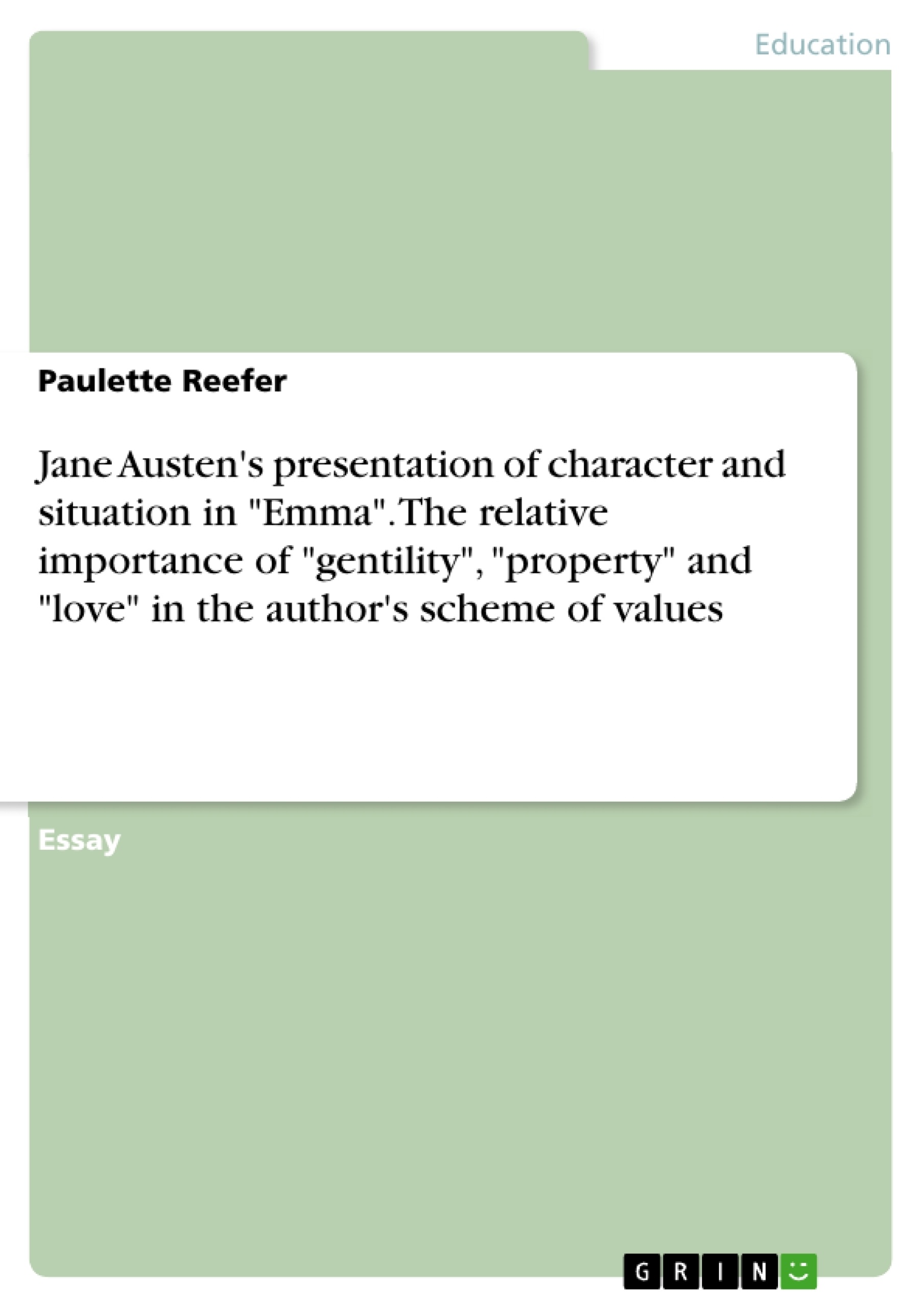Jane Austen was notably often considered a child more of the eighteenth century than of the nineteenth century. Most of her novels affirm the presence of an orderly society and its entrenched values. She valued universal and fundamental conventions such as consideration for others, good principles, and good judgement.
In the novel Emma, Jane Austen demonstrates great concern for the stability of old values in the rapidly changing Highbury society. Her world comprises the traditional feudal systems with the landowners and yeomanry undergoing a transitional phase in its social structure. The community faces a new rising middle-class sector, which makes its money utilizing business and trade and would like the prestige of the gentry’s class. The new class also threatens the traditional hierarchy of the old gentry. The gentry’ class is the custodian of gentility and it must always observe the code for the sake of order. As such, Austen’s heroine Emma, of the old gentry is one of the dominating figures in the novel; who ultimately reconciles to her leadership position in society and her role as an exemplary female.
In this society, the value placed on gentility seems to exceed that of property and love. The value associated with love is subtly underrated as compared to the values of gentility and property. The pivotal events of the novel concern the marriage of young women to men and in this regard, the integration of the values of property, gentility, and love, is of prime importance. A perfect union forms only when these three values coalesce between the couple. There is sometimes much ambiguity in assessing the relative importance of these values to the author, as Austen unfolds unobtrusively several points of view in the novel.
Inhaltsverzeichnis (Table of Contents)
Zielsetzung und Themenschwerpunkte (Objectives and Key Themes)
This essay aims to assess the relative importance of "gentility," "property," and "love" in Jane Austen's Emma, considering how these values shape the characters' actions and relationships within the novel's social framework. Austen's portrayal of Highbury society, with its traditional gentry and emerging middle class, allows for an exploration of how these values intersect and influence individual choices and societal expectations.
- The importance of gentility as a marker of social standing and moral character.
- The role of property in determining social status and marriage prospects.
- The complexities of love and its potential for both happiness and folly.
- The tension between traditional values and the changing social landscape.
- The significance of marriage as a means of achieving social stability and personal fulfillment.
Zusammenfassung der Kapitel (Chapter Summaries)
Gentility
The essay delves into Austen's portrayal of gentility, exploring its two key facets: gentility of blood and gentility of mind. It highlights how characters like Mr. Knightley embody the ideal of gentility, characterized by good manners, self-restraint, and a strong moral compass. In contrast, Emma Woodhouse, despite her privileged background, initially exhibits a more superficial understanding of gentility, prioritizing outward appearances and social status over genuine kindness and compassion.
Gentility of Blood
The essay examines the significance of inherited gentility, highlighting its influence on social standing and expectations. It explores how characters like Mrs. Elton, despite lacking true gentility of mind, leverage their social position for personal gain, exemplifying the potential for superficiality and snobbery within the upper classes.
Gentility of Mind
The essay discusses Austen's portrayal of gentility as a matter of character and conduct. It highlights how characters like Jane Fairfax, despite lacking a privileged upbringing, demonstrate genuine gentility through their refined manners, intellectual pursuits, and moral integrity. This emphasizes Austen's belief that true gentility transcends social status and can be cultivated through personal development.
Property
The essay explores the importance of property in Austen's world, noting its role in determining social standing, marriage prospects, and overall social mobility. It highlights how characters are often judged based on their financial resources and the property they own, illustrating the societal emphasis on wealth and its influence on individual relationships.
Love
The essay examines the complexities of love in Austen's Emma, suggesting that while love is subtly presented as a paramount value, it is often intertwined with considerations of property and social standing. It explores how characters like Mr. and Mrs. Elton engage in marriages motivated by financial gain, while others, like Emma and Mr. Knightley, ultimately find love based on mutual respect, understanding, and genuine affection.
Schlüsselwörter (Keywords)
Key terms and concepts explored in the essay include: gentility, property, love, social status, marriage, Highbury society, traditional values, social change, Austen's moral vision, and the interplay between wealth, character, and relationships in Austen's world.
Frequently Asked Questions
What are the three core values analyzed in Jane Austen's "Emma"?
The essay evaluates the relative importance of "gentility," "property," and "love" within the social framework of the novel.
What is the difference between "gentility of blood" and "gentility of mind"?
Gentility of blood refers to inherited social status, while gentility of mind relates to a person's moral character, conduct, and refined manners, which Austen often values more highly.
How does property influence marriage prospects in the novel?
Property is a major determinant of social standing; characters are often judged by their wealth, and financial considerations frequently dictate the feasibility of marriage unions.
Why is Emma Woodhouse considered a "custodian of gentility"?
As a member of the old gentry, Emma holds a leadership position in Highbury society and must learn to reconcile her social status with exemplary moral behavior.
What constitutes a "perfect union" according to the analysis of Austen's values?
A perfect union in Austen's scheme occurs only when the three values—gentility, property, and love—coalesce between the couple, as seen in the marriage of Emma and Mr. Knightley.
- Quote paper
- BA Literatures in English, Diploma in Education Masters Literatures in English Paulette Reefer (Author), 1989, Jane Austen's presentation of character and situation in "Emma". The relative importance of "gentility", "property" and "love" in the author's scheme of values, Munich, GRIN Verlag, https://www.grin.com/document/343320



